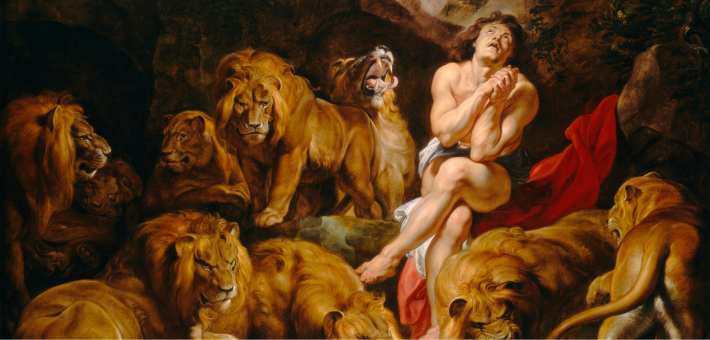Commentary on Daniel 6:6-27
“Daniel in the Lions’ Den” is a well-known story, frequently abridged and adapted for children’s media. It is a compelling narrative of how Daniel’s faith in God not only protects him in a situation of certain death, but also influences the foreign king in whose court he serves—so much so that the king eventually confesses faith in Daniel’s God.
The story conveys certain values: faith in God, trust in God’s power on behalf of those who are faithful, and submission to authority even in situations that might result in death. The narrative seems to provide clear direction: Show fidelity to both God and your employer, and if it puts you in a dangerous situation, God will save you.
The stories in the first six chapters of the book of Daniel become richer when we consider the context in which they were written. In 332 BCE, Alexander the Great marched through Judah (Greek name: Judea) during his conquest of the Persian Empire. Biblical scholarship refers to the ensuing period as the “Hellenistic Period,” recognizing the influence of Greek culture, language, literature, philosophy, athletics, art, and architecture on Judea and other provinces within the empire. Schools, called gymnasia, taught Greek culture and values to elite young men.
While some people may have welcomed elements of Greek culture—and the elites of society would likely have found it politically expedient to assimilate, at least to some extent—we can also recognize how aspects of Greek culture would run up against traditional Jewish identity. Greek cultural practices such as the worship of multiple deities, the representation of those deities in statuary and coins, athletic activities performed naked, and different dietary practices were surely just a few that would prove problematic to many.
When Alexander died without an heir and his empire was divided between four generals, Judea came under the rule of the Ptolemies (centered in Egypt) until around 200 BCE, then the Seleucids (centered in Syria), until a brief period of Judean independence from the mid-second century to 63 BCE. In 167 BCE, responding to local unrest, the Seleucid ruler Antiochus IV occupied Jerusalem and turned the Jewish temple into a Greek temple by sacrificing a pig—typical of a Greek ceremony, but a sacrilege for Jews—and erecting a statue of Zeus. Distinctive cultural and religious practices, like observing the sabbath and circumcising one’s sons, were banned.
Concerns about adopting Greek culture turned into a crisis for many Jews. How should one respond to Antiochus’s policies? A variety of responses emerged, driven by factors such as one’s social and/or geographical location and how one interpreted fidelity to Jewish traditions. The stories in Daniel 1–6, then, provide a glimpse into how some ancient Jews interpreted questions of how to be faithful to God under these challenging, even dangerous circumstances.
The stories focus on Daniel and his three colleagues, young Judean men serving in the court of “Babylonian” or “Persian” kings (here we should read “Greek” instead, to understand the stories in their historical context). The narratives show the complexities of navigating life under Seleucid rule, even for elite young men. The fact that they receive “Babylonian” names (Belteshazzar, Shadrach, Meshach, and Abednego) in addition to their Hebrew names (Daniel, Hananiah, Mishael, and Azariah; Daniel 1:6), as well as a “Babylonian” education (Daniel 1:4), indicates their willingness to work within the “Babylonian” system and adopt some local practices. They are even promoted within the court ( 2:48; 3:30)!
However, they negotiate with their overlords for permission not to eat the “Babylonian” food and demonstrate that they can thrive on a vegetarian diet, even surpassing the wisdom of their “Babylonian” peers (1:8–20). Nonnegotiable for these young men is the worship of any king or god other than their God; Daniel and his colleagues steadfastly refuse to do so, even risking the consequences of a furnace of fire (chapter 3) and a den of lions (chapter 6) for these acts of resistance.
Note that it is a particular kind of resistance; in Daniel 6, Daniel does not fight, or try to go unnoticed (he prays to his God in front of open windows; 6:11), or make a speech willing God to intervene before dying a martyr’s death. By depicting these men quietly but firmly remaining faithful to what really matters while working within the “Babylonian” government, the stories point to a hope for change within the system; the Judeans’ faithfulness brings about a change in perspective in the king.
Yet this was not the only Jewish response to Antiochus IV’s policies!1 Reading biblical texts is a bit like reading the “Opinion” section of a newspaper, where multiple writers express different interpretations of current events and offer differing visions of how to navigate them. The Apocryphal/Deuterocanonical books of 1 Maccabees and Judith convey the values behind the Maccabean War, an armed resistance movement that resulted in the expulsion of the Seleucids from the Jerusalem temple and its rededication as a temple of the Lord. The latter chapters of Daniel, an example of apocalyptic literature, express hope in divine (in other words, not human!) intervention to bring an end to Seleucid rule.
Because abridged and adapted children’s versions of Daniel 6 are so well known, it is especially important to pay close attention to the biblical story and understand its larger literary and historical context. We come to see that answering the question of what “faithfulness” means can be complicated! A narrative that seems to present clear and straightforward guidance can serve as a reminder to ask more questions, seek out multiple viewpoints, and embrace and navigate complexity as its own act of faithfulness.
Notes
- For more about Jewish reactions and literary responses to Antiochus IV’s policies, see Warren Carter, Seven Events That Shaped the New Testament World (Grand Rapids: Baker, 2013), 47–55.
PRAYER OF THE DAY
God of deliverance,
You rescued Daniel from the mouths of the lions when he was punished for worshiping you. Liberate all who are endangered for the sake of their faith, and rescue us from anything that separates us from worshiping only you, for the sake of the one who made your name known to all people, across land and seas, Jesus Christ, our redeemer. Amen.
HYMNS
Creator of the stars of night ELW 245, H82 60, UMH 692, NCH 111
The glory of these forty days ELW 320, Verses 3, 4, H82 143
Blessed be the God of Israel ELW 250, UMH 209
CHORAL
We are waiting, William Paxson


December 1, 2024